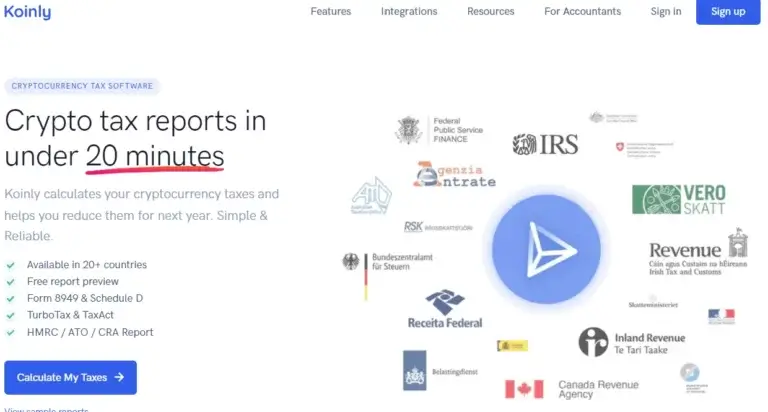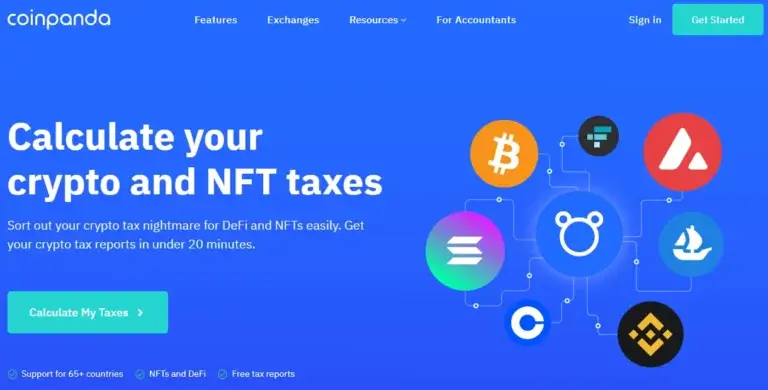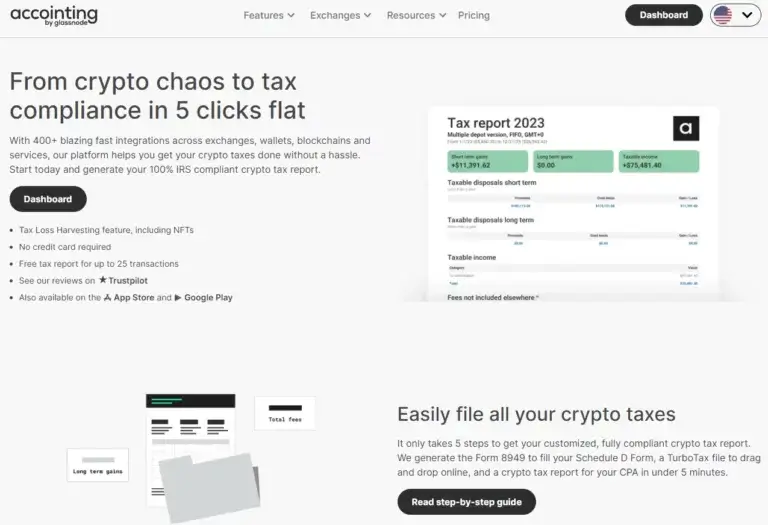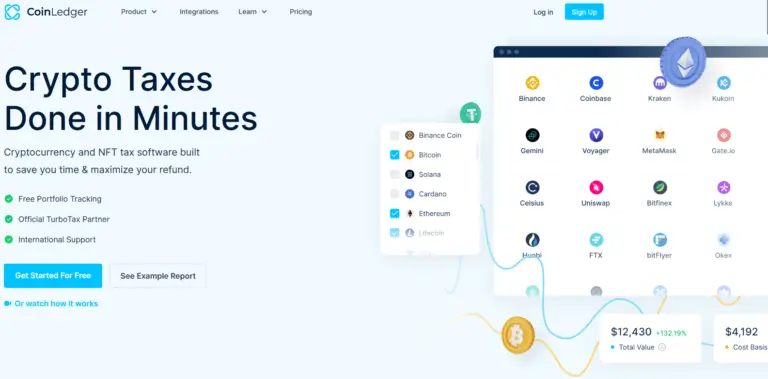Crypto tax software: the unsung hero of the cryptocurrency world. With countless choices available, navigating the sea of options can be daunting.
But have no fear, friend! When searching for the perfect crypto tax software, consider factors like reputation, features, exchange integration, pricing, customer support, and security.
Doing your homework pays off – it’s worth investing the time to find your ideal match.
Don’t worry – I’ve done the legwork for you! Trust me, this is one decision you won’t regret.
Looking for a quick answer?
Table of Contents
Introducing the world of crypto tax software - Why is it important to get the best crypto tax software?
Selecting the right cryptocurrency tax software is crucial for several reasons. Here are a few key points highlighting the importance of choosing the appropriate software:
- Accuracy: Cryptocurrency transactions can be complex, involving multiple exchanges, wallets, and
various types of tokens.
The right tax software can handle complexities, automate the process, and minimize errors. Ensure precise and compliant tax submissions every time. - Time and Efficiency: Manually tracking and calculating cryptocurrency transactions for tax purposes is time-consuming and error-prone.
A trustworthy tax software can streamline the process, automatically importing transactions, categorizing them, and generating comprehensive reports.
This enables more time for important matters. - Tax Reporting Compliance: Cryptocurrency tax regulations are evolving, and it can be challenging to stay up to date with the latest requirements.
An effective crypto tax software keeps pace with regulatory changes and ensures that your tax reporting is compliant with the current laws.
This helps mitigate the risk of penalties or audits due to inaccurate or incomplete reporting. - Tracking Cost Basis: Determining the cost basis of your cryptocurrency holdings is crucial for calculating capital gains or losses.
Crypto tax software can assist in accurately tracking your cost basis, considering factors such as FIFO (First-In, First-Out), specific identification, or other methods approved by the tax authorities.
This ensures that your tax calculations are done correctly and reduces the burden of manual record-keeping. - Audit Support: In the event of an audit or if you need to provide documentation to tax authorities, having reliable tax software can simplify the process.
It typically provides comprehensive reports and documentation, making it easier to present your cryptocurrency transactions and associated taxation calculations, thus supporting your compliance efforts.
Why take chances with the taxman? Use crypto tax software to simplify tax filings, but be sure to always verify the reports before submission.
For complex tax situations or cryptocurrency holdings, it’s always wise to consult with a qualified tax professional.
Play it safe – go for the double defense!
You may want to try and find crypto tax software free of charge, but this is looking for trouble.
Don’t do it.
You may find crypto tax software free for a trial period which is fine, in fact that is encouraged, but do not try and skimp on this important tax software solution as it could potentially cost you thousands.
The importance of accuracy in your crypto tax filing - How to make sure you get it right.
- Legal Compliance: Don’t get slammed by hefty fines or legal consequences just because you failed to file your taxes on crypto transactions.Tax authorities in many countries, including the United States, view cryptocurrencies as taxable assets. By filing your crypto taxes, you demonstrate compliance with tax laws and fulfill your duties as a responsible citizen. Don’t wait to pay what you owe— act now to avoid the potential penalties and legal repercussions.
- Avoiding Penalties and Audits: Taxes are a pain, but avoiding them can be an even bigger one. Don’t risk penalties or an audit by turning a blind eye to tax regulations that apply to your crypto transactions.Simply report accurately and pay the dues. It’s the smart move to stay out of trouble and keep the focus on growing your wealth.
- Peace of Mind: Filing your crypto taxes provides peace of mind by maintaining a clear and transparent record of your financial activities.By staying compliant, you can eliminate the stress and worry associated with potential legal consequences or future audits.
- Building a Tax History: Consistently filing your crypto taxes helps you build a solid tax history.This can be beneficial in situations such as applying for loans, mortgages, or other financial services where a strong tax history can positively impact your credibility.
- Opportunities for Deductions and Losses: Properly reporting your cryptocurrency transactions allows you to take advantage of potential tax deductions and offset capital gains with capital losses.By accurately tracking and reporting your crypto activities, you can maximize your tax benefits within the framework of tax regulations.
- Contributing to Crypto Industry Legitimacy: By voluntarily filing your crypto taxes, you contribute to the overall legitimacy and acceptance of cryptocurrencies.Compliance with tax regulations helps foster a positive perception of the industry, supporting its long-term growth and mainstream adoption.
How Cryptocurrency Is Taxed in Different Countries?
United States:
- The Internal Revenue Service (IRS) treats cryptocurrencies as property for tax purposes.
- Cryptocurrency transactions, such as selling, exchanging, or using cryptocurrency to purchase goods or services, may trigger capital gains or losses.
- Cryptocurrency mining is considered taxable income.
- Reporting requirements include filing Form 8949 and Schedule D with the individual’s annual tax return.
United Kingdom:
- The UK classifies cryptocurrencies as assets, subject to capital gains tax (CGT) when disposed of.
- Individuals are required to calculate and report capital gains or losses when selling or exchanging cryptocurrencies.
- Cryptocurrency mining may also be subject to income tax.
- There are specific rules for businesses accepting cryptocurrencies as payment, involving VAT (Value Added Tax) and Corporation Tax.
Canada:
- Cryptocurrencies are considered commodities in Canada, and the Canada Revenue Agency (CRA) treats them as taxable assets.
- Capital gains tax applies when individuals sell or exchange cryptocurrencies.
- Cryptocurrency mining is subject to taxation, including both income tax and GST/HST (Goods and Services Tax/Harmonized Sales Tax).
- Reporting requirements include filing the T1135 form for foreign cryptocurrency holdings and reporting gains and losses on the individual’s tax return.
Germany:
- Germany treats cryptocurrencies as private money, meaning they can be used as a medium of exchange for goods and services.
- Cryptocurrency transactions for personal use (e.g., buying coffee) are exempt from capital gains tax.
- If cryptocurrencies are held as investments and sold for a profit, capital gains tax applies after a holding period of one year.
- Cryptocurrency mining is subject to income tax.
- There is an exemption from capital gains tax for cryptocurrencies held for more than ten years.
These examples demonstrate that tax treatment of cryptocurrencies varies across different countries.
It’s important to understand the specific regulations and reporting requirements in your country to ensure compliance with tax laws.
Consult with a tax professional or accountant for the best crypto tax advice based on your circumstances and jurisdiction.
Crypto Tax Reports in the United States
In the United States, crypto tax reports are the documentation required to accurately report your cryptocurrency transactions and calculate any associated tax liabilities. Here are some common reports used in the United States:
- Form 8949: This form is used to report capital gains and losses from the sale, exchange, or disposal of cryptocurrencies.
Each transaction involving the buying or selling of cryptocurrency needs to be reported individually on this form.
The information reported on Form 8949 is then transferred to Schedule D of your individual tax return (Form 1040). - Schedule D: Schedule D is where you summarize the capital gains and losses from Form 8949.
The net gain or loss calculated on Schedule D is then combined with other income and deductions to determine your overall tax liability. - Form 1040: This is the main individual tax return form used to report your income, deductions, and tax liability.
The information from Schedule D is entered on Form 1040 to calculate the final tax amount owed or refunded. - Form 1099-K: Some cryptocurrency exchanges and payment processors issue Form 1099-K to report transactions for certain users. If you receive a Form 1099-K, you should include the information from the form on your tax return to ensure accurate reporting.
However, it’s important to note that Form 1099-K is not always provided for cryptocurrency transactions, and you are still responsible for reporting all your cryptocurrency activities, even if you don’t receive a 1099-K.
Additionally, it’s important to maintain detailed records of your cryptocurrency transactions, including the date of acquisition, cost basis, date of sale or exchange, proceeds, and any relevant transaction fees.
These records will help support your tax submissions and calculations.
It’s worth mentioning that tax reporting requirements and forms may vary depending on the specific circumstances of your cryptocurrency activities, such as mining, staking, or receiving crypto as income.
Consulting with a tax professional or using the best crypto tax software can help ensure that you accurately report your cryptocurrency transactions and fulfill your tax obligations according to the latest regulations in the United States.
What to look for when selecting the best crypto tax software package for your needs
When selecting the best crypto tax software package for your needs, there are several factors to consider. Here are some key aspects to look for:
- Accuracy and Calculation Methods: Ensure that the software is capable of accurately calculating your cryptocurrency gains and losses based on the tax rules and methods applicable in your jurisdiction.
It should support various accounting methods, such as FIFO, LIFO (Last-In, First-Out), or specific identification, and handle complex scenarios like cryptocurrency forks, airdrops, or staking rewards. - Integration with Exchanges and Wallets: Check if the software integrates with the cryptocurrency exchanges and wallets you use. The ability to automatically import your transaction data saves time and reduces the risk of manual errors.
The more exchanges and wallets supported, the better, as it allows for a comprehensive view of your crypto activities. - User-Friendly Interface: Look for a software package with a user-friendly interface and intuitive navigation. It should be easy to input and review your transactions, generate reports, and understand the calculations.
A well-designed interface enhances the overall user experience and streamlines the tax reporting process. - Tax Reporting Features: The software should offer a range of tax submission features, such as the ability to generate tax forms like Form 8949 and Schedule D, summary reports of capital gains and losses, and transaction history.
It should also provide clear documentation to support your tax filings, making it easier to comply with reporting requirements. - Security and Data Privacy: Since you’ll be entrusting your sensitive financial data to the software, prioritize security. Ensure that the software uses encryption and other security measures to protect your information.
Additionally, review the software’s data privacy policy to understand how they handle and store your data. - Customer Support: Check the availability and responsiveness of customer support provided by the software company.
Look for options like live chat, email support, or a knowledge base to assist you in case of any issues or questions that arise while using the software. - Pricing: Evaluate the pricing structure of the software package. Some software options charge a one-time fee, while others may have a subscription-based model.
Consider your budget and compare pricing plans to find the one that aligns with your needs. - Reviews and Reputation: Read user reviews and seek recommendations from trusted sources to gauge the software’s reliability and performance.
Consider the reputation of the software provider and their experience in the crypto tax industry.
A comprehensive look at the 11 best crypto tax software solutions available in 2023.
The list of the 11 best crypto tax software packages includes a range of comprehensive and user-friendly solutions to simplify cryptocurrency tax submission.
These crypto tax software packages offer features such as accurate calculations, integration with multiple exchanges and wallets, support for various tax scenarios, and user-friendly interfaces.
They prioritize data security and privacy while providing a seamless experience for importing and managing cryptocurrency transactions.
With their robust reporting capabilities and customer support, these software packages empower individuals and businesses to accurately track and report their crypto activities, ensuring compliance with tax regulations and helping to streamline the tax filing process.
- Koinly
- ZenLedger
- Coinpanda
- CoinTracking
- Accointing
- TokenTax
- CoinLedger
- TaxBit
- BitcoinTaxes
- FYN
- CoinTracker
Koinly: the genius wizard that magically connects with your wallets, exchanges, blockchain addresses and services, giving you a crystal-clear view of your crypto investments across all platforms. Tax season just got a little less scary.
Features:
- Connects with 353 leading crypto exchanges, 74 top-notch wallets and 14 highly secure blockchain addresses.
- Automatically synchronize data from multiple sources.
- Export your transaction data to other tax software, such as TurboTax, TaxAct, and more. This feature allows a hassle-free migration of your data while still maintaining its accuracy and integrity.
- Keep an eye on your portfolio across multiple wallets and accounts. Get real-time updates on profit and loss, coupled with tax liabilities.
Verdict: With Koinly, grinding through crypto taxes is a thing of the past. It calculates tax owed on your crypto exchanges and exports results seamlessly. And with glowing reviews, you know it’s legit
Pros:
- Features are available at a reasonable cost on paid plans.
- Integrates too many exchanges and wallets.
- International tax filing supported.
Cons:
- Unfortunately, there isn’t a standalone tool for tax-loss harvesting available currently.
- Free plans don’t cover tax reports.
Pricing:
- Newbie: $49 per tax year
- Hodler: $99 per tax year
- Trader: $179 per tax year
- Pro: $279 per tax year
With over 400 exchanges and 30 DeFi protocols integrated, ZenLedger’s software will make you wonder if doing your crypto taxes could ever be as fun as a roller coaster ride. Don’t let tax season scare you when ZenLedger delivers an experience so slick, you’ll wish all of your favorite apps were run by this team.
Features:
- Track your crypto profitability with ease, analyzing transactions to calculate profits and losses.
- TurboTax integration is possible.
- All of its plans provide access to a tax professional. Let an expert handle your taxes.
- Use loss harvesting tools and unified accounting reports to enhance your business’s record-keeping and financial management capabilities.
Verdict: ZenLedger offers a complimentary plan, offering an only developer access to a tax pro. However, this plan is restricted to the tracking of 25 transactions. It can help those who HODL their assets.
Pros:
- Fees are based on the volume of transactions processed.
- Decentralized applications are mainly supported on pricier packages for high-end users, which can be a barrier for those on a budget.
- Expert tax professionals are at your service, ready to provide their knowledge and expertise.
Cons:
- The entry-level package, while containing professional assistance, is comparatively expensive. In comparison to competitors, it is more costly.
- Not international so you are out of luck outside the US.
Pricing:
- Free: $0 per year
- Starter: $49 per year
- Premium: $149 per year
- Executive: $399 per year
Taxing crypto finances? Think outside the box! With Coinpanda, generating comprehensive tax reports in under 20 mins is a piece of (crypto) cake! Gain valuable insight into your transactions and taxable gains with one exceptional platform- Say goodbye to complexity!
Don’t let the taxman spoil your crypto fun! Coinpanda can show you the acquisition costs, earnings, and long/short-term gains of your NFTs and crypto assets, plus tailored tax reports for 65+ countries. Because nothing says “crypto genius” like being tax compliant.
Features:
- Capital Gains Report
- Decentralized finance support is available across all blockchains.
- Easily calculate your profit and loss for all futures and margin trading with automatic calculations.
- Produce comprehensive reports for income, staking, and mining activities with precision and ease.
Verdict: Coinpanda is a leading platform that expertly handles your tax reporting with speed, ease, and precision. With compliance in mind, each tax report produced adheres to local tax laws and authoritative bodies such as the IRS, CRA and more. Without question, Coinpanda is among the finest service providers for your cryptocurrency tax needs today.
Pros:
- Quick and Accurate Tax Reporting.
- Comprehensive support for both lost coins and donations.
- Reporting taxes specific to each country..
- Easily import from over 800 exchanges and wallets.
Cons:
- It’s imperative to enhance the responsiveness of customer support.
Price:
- Forever Free Plan for 25 transactions
- Hodler: $49 for 100 transactions
- Trader: $99 for 1000 transactions
Pro: $189 for 3000+ transactions
CoinTracking: where you can track your crypto and taxes without pulling your hair out! With 930K+ active users, their platform features provide detailed market trends for 12,033 coins and automated crypto transaction importing tools.
Features:
- Access effective tools to analyze coin trends for trading purposes.
- Receive comprehensive reports outlining both profits and losses.
- Data importation from over 110 of the world’s leading exchanges.
- You can now effortlessly export tax reports to CPSs or tax offices with just a few clicks.
- Their tutorials are provided via in-depth FAQs and engaging videos, delivering efficient and enjoyable learning experiences..
- Crypto traders and companies alike can benefit from CoinTracking’s accurate tax reporting.
Verdict: CoinTracking stands out as a leading crypto tax software with unique features for tax reporting and market analysis. It also offers a free version to track up to 200 transactions. If you’re navigating the complexities of crypto taxes, CoinTracking is a highly recommended solution.
Pros:
- The platform supports over 5,000 coins and multiple exchanges for your convenience.
- Their platform supports API-based cryptocurrency trading, and includes detailed charting and portfolio tracking capabilities.
- Applications compatible with Android and iOS.
Cons
- Importing for just 2 wallets is supported in the free version..
- The platform does not support ICOs.
Pricing:
- Free
- Pro: $10.99 per month
- Expert: $16.99 per month
- Unlimited: $54.99 per month
- Corporate: Contact them for prices.
Tracking and reporting your crypto taxes doesn’t have to be a pain in the assets 🤑
Accointing’s got your back with features like tax loss harvesting and easy-to-file tax reports. Plus, our software provides market insights and portfolio analysis!
Features:
- Lage powerful tools to meticulously analyze your portfolio. With the right insights, you can make smarter decisions to optimize your strategy and reap bigger rewards.
- Allows you to explore the crypto market.
- Track your progress with precision! Quickly calculate gains and losses.
- The system generates tailor-made tax reports for your ease. These can be effortlessly downloaded and used for document filing purposes, saving you time and hassle.
- Tax-loss harvesting.
Verdict: Accointing’s free version is an optimal choice for novice traders as it facilitates tax reporting for up to 25 transactions.
Pros:
- Simple to set up, with support for both desktop and mobile platforms.
- Our integration supports over 300 exchanges and wallets, with 7500+ currencies in tow — every portfolio backed. Keep tabs on all your investments with seamless portfolio tracking included.
- Crypto tax expert support.
Cons:
- Exclusive priority support available only with Pro plans..
Pricing:
- Trader: $199
- Hobbyist: $79
- Free Tax: $0
- Pro: $299
Don’t let crypto taxes drag you down! TokenTax has your back with user-friendly software that makes tax reporting a breeze. So sit back, relax, and let TokenTax handle the *boring* stuff!
Features:
- Provides aid with audits.
- Supports all exchanges that allow data exports.
- Tax loss harvesting.
- The system seamlessly integrates with exchanges that offer API’s to automatically collect your data.
- Consult a cryptocurrency accountant for expert assistance.
- It has the capacity to not only compute but also submit your tax returns..
Verdict: TokenTax is the ultimate cryptocurrency tax software that calculates and files taxes while providing a tax loss harvesting feature. With the ability to cut tax liabilities, it’s no surprise that TokenTax is among the top recommended crypto accounting programs.
Pros:
- International nature
- Tax-loss harvesting tool available.
- 85+ exchanges.
Cons:
- No free trial.
- The basic plan has limited features.
Price: Crypto + full tax filing price plans range from $699 per tax year to $3,000 per tax year.
Plans for crypto tax reporting are as follows:
- Basic: $65 per tax year
- Premium: $199 per tax year
- Pro: $799 per tax year
- VIP: $2,500 per tax year
Coinledger (formerly CryptoTrader.Tax) is a renowned tax software with over 100k satisfied customers. It offers support for 10,000+ cryptocurrencies, syncing through unlimited exchanges, & current profit and loss reports for your ease.
With these rich features and more, Coinledger makes tax reporting smoother than ever.
Features:
- Allows you to import your transaction data easily, from different crypto platforms.
- Offers you a download of the completed tax forms, which can then be sent to your tax software or your CPA.
- Complete audit support.
- Tax loss harvesting tools.
Verdict: Penny-pinching for a top-rated crypto tax tool? Coinledger won’t put a Crypto-trading-sized hole in your wallet! With an extensive range of features and reasonable pricing, it’s reigning supreme amongst crypto traders.
Pros:
- Tax-loss harvesting opportunities.
- TurboTax integration.
- Competitive with multiple tiers.
Cons:
- No direct filing of tax returns.
- Limited customer support for lower-priced tiers.
Pricing:
They offer a 14-day money-back guarantee. Pricing plans are as follows:
- Hobbyist: $49
- Day Trader: $99
- High Volume: $199
- Unlimited: $299
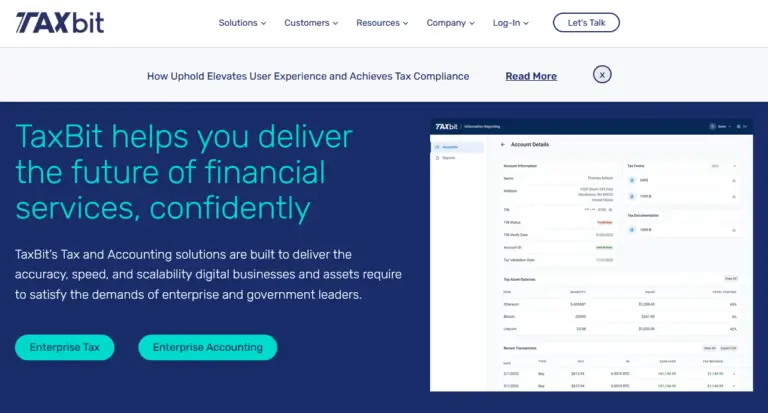
#8 TaxBit
TaxBit is a leading crypto tax solution, founded by experienced CPAs and tax attorneys. Whether you’re a consumer needing to transform 1099s and other data into crypto tax reports, or an enterprise needing to issue 1099s, TaxBit provides an automated technology that syncs your data and generates final tax reports.
This lets you focus on other important tasks, while they take care of taxes for you.
Features:
- The platform provides support for over 150 exchanges and 2000+ currencies, offering unparalleled access and versatility.
- You export your transaction reports with ease.
- The dashboard packs a punch, laying out your tax position, asset balances, and unrealised profits/losses in a simple yet comprehensive display.
- Their platform offers two powerful features: tax loss harvesting and portfolio performance analysis.
Verdict: TaxBit, an easy-to-use crypto tax tool, is applauded for its excellent customer service. Its automation feature synchronizes transactions across different exchanges and provides tax reports without requiring any input from the user – a definite plus.
Pros:
- Fantastic customer service agents.
- An unalterable record of transactions, paired with automatic 1099 issuance for exchanges..
Cons:
- Formatting CSV files manually can be a tedious task.
- Automated synchronization reporting: limited.
Pricing:
- Basic: $50 per year
- Prus: $175 per year
- Pro: $500 per year

#9 BitcoinTaxes
By using BitcoinTaxes, you can easily keep track of your capital gains and losses, ensuring tax compliance. Additionally, an experienced crypto tax professional is available to provide guidance on properly entering crypto trades in Bitcoin.tax, taking the complexity out of tax season.
Features:
- Determine your capital gains and losses with precision.
- Their services also include comprehensive tax preparation, with prices beginning at $600.
- Take advice from tax professionals, for tax planning.
- Tax loss harvesting.
Verdict: BitcoinTaxes is a top-notch software to manage crypto taxes, that offers flexible pricing options which means you won’t be charged for what you don’t use. Additionally, the diverse range of features that it provides is truly noteworthy.
Pros:
- Simplify tax filing by importing CSV files and uploading transaction histories from your wallets and exchanges.
- Create comprehensive reports for capital gains, incomes, donations and closing balances.
- Form 8949, TaxACT, and TurboTax TXF formats.
Cons:
- Basic accounts offer restricted features.
- The gratis version permits only up to 100 transactions..
Pricing:
There is a free plan and paid plans are as follows:
- Premium: $39.95 per tax year
- Premium Extra: $49.95 per tax year
- Deluxe: $59.95 per tax year
- Trader (50k): $129 per tax year
- Trader (100k): $189 per tax year
- Trader (250k): $249 per tax year
- Trader (500k): $379 per tax year
- Trader (1M): $499 per tax year
- Trader (unlimited): Contact them for pricing.

#10 FYN
FYN (formerly Bear.TAX) is a comprehensive cryptocurrency tax software that completely automates the process from transaction importation to tax calculation and report generation. What’s more, FYN enables easy communication with your accountant or preferred tax software.
Features:
You can effortlessly import all your trades regardless of the crypto exchange you use.Enjoy automated tax processing that conveniently sends your tax documents to your CPA or tax software.Track your crypto profits and losses efficiently with ease!Access an array of reports such as sales, audit trails, and more.
Verdict: FYN is an affordable and recommended tax software. The automation features offered by this crypto tax software are appreciable.
Pros:
Support traditional tax software.Get support from tax professionals
Cons:
Support for lesser markets. About 50 exchanges.Not available for tax reporting in some countries.
Pricing:
Starter: Free up to 500k transactionsEnterprise: Contact them for pricing
#11 CoinTracker
CoinTracker is a trusted crypto tax software that boasts over 500,000 users. It automatically tracks your portfolio and saves you money through its tax-loss harvesting tools.
Utilizing CoinTracker can help optimize tax savings by capturing all of your taxable crypto transactions in real-time, a must-have tool for any investor seeking peace of mind.
Features:
- Automation features to sync your transaction data from unlimited crypto exchanges.
- Calculate capital gains.
- Allow you to export your tax reports to TurboTax or TaxAct.
- You can consult a personalized CPA with the unlimited plan.
- Supports more than 2500 cryptocurrencies.
Verdict: CoinTracker is commendable crypto tax software to help you with your filing. While its features are laudable, it is important to note that it currently tracks 2500 cryptocurrencies, which is fewer than many of its competitors.
Pros:
- Android and iOS apps are available.
- 12 different methods for generating tax reports.
- Over 7,000 cryptocurrencies are supported.
Cons:
- Limited transactions (25) and no chat support for the free plan. Unlimited transactions only on the unlimited paid plan.
Price:
There is a 30-day money-back guarantee. The other pricing plans are as follows:
- Free
- Hobbyist: Starts at $59
- Premium: Starts at $199
- Unlimited: Priced individually
Tips for reducing taxes on your cryptocurrency holdings
While it’s important to consult with a tax professional or accountant for personalized advice based on your specific situation, here are some general tips for potentially reducing taxes on your cryptocurrency holdings:
- Holding Period: In many jurisdictions, the tax rate on capital gains decreases the longer you hold an asset. If you hold your cryptocurrencies for more than a year, you may qualify for long-term capital gains tax rates, which are typically lower than short-term rates. Consider the potential tax benefits of holding your cryptocurrencies for a longer period before selling.
- Loss Harvesting: If you have cryptocurrencies that have experienced losses, consider selling them to offset capital gains from other investments. This strategy, known as tax loss harvesting, allows you to use capital losses to reduce your overall tax liability. However, be mindful of wash-sale rules, which prevent claiming losses if you repurchase a similar asset within a certain timeframe.
- Donating Cryptocurrencies: Donating cryptocurrencies to eligible charities or nonprofit organizations may provide tax benefits. In some countries, such as the United States, donating appreciated cryptocurrencies can result in a deduction for the fair market value of the donated amount, potentially reducing your taxable income.
- Properly Tracking Cost Basis: Accurately tracking the cost basis of your cryptocurrency holdings is essential for calculating capital gains or losses. This can help minimize your tax liability by ensuring you only pay taxes on the actual gains realized. Consider using crypto tax software or maintaining meticulous records to track your cost basis accurately.
- Tax-Advantaged Accounts: Depending on your jurisdiction, you may have access to tax-advantaged accounts like Individual Retirement Accounts (IRAs) or Self-Invested Personal Pensions (SIPPs) that offer tax benefits. Contributing cryptocurrencies to these accounts may allow for tax-deferred or tax-free growth, potentially reducing your tax burden.
- Seeking Professional Advice: Cryptocurrency tax laws can be complex, and they may vary depending on your jurisdiction. Seeking guidance from a tax professional or accountant who specializes in cryptocurrency taxation can help you navigate the specific regulations, identify potential tax-saving strategies, and ensure compliance with the law.
Remember, tax planning should be done in consultation with a qualified professional who can provide personalized advice based on your unique circumstances and the tax laws applicable in your jurisdiction.
Common mistakes made when filing crypto taxes - what to watch out for
When filing crypto taxes, it’s important to avoid common mistakes that can lead to inaccuracies or potential issues with tax compliance. Here are some key mistakes to watch out for:
- Not Reporting All Transactions: Failing to report all cryptocurrency transactions is a common mistake. Remember that each time you sell, exchange, or use cryptocurrency to purchase goods or services, it may trigger a taxable event.
Ensure that you accurately report all relevant transactions, including those involving different cryptocurrencies or between different exchanges. - Ignoring Crypto-to-Crypto Transactions: Some individuals mistakenly believe that crypto-to-crypto transactions are tax-free.
However, in many jurisdictions, crypto-to-crypto trades are treated as taxable events, and capital gains or losses need to be reported. Be sure to track and report all crypto-to-crypto transactions to accurately calculate your tax liability. - Forgetting to Report Airdrops and Forks: Airdrops and forks can result in the receipt of new cryptocurrencies. It’s important to report these events and their respective values as taxable income.
Failure to report airdrops or forks can lead to underreporting your income and potential penalties. - Incorrectly Calculating Cost Basis: Accurate calculation of the cost basis is crucial for determining capital gains or losses. Mistakes in determining the cost basis can result in incorrect tax calculations.
Ensure that you properly track and document the cost basis of your cryptocurrencies, including any adjustments for fees, commissions, or previous transactions. - Neglecting to Report Crypto Mining: If you participate in cryptocurrency mining, the rewards you receive are generally considered taxable income.
Report your mining income accurately and include any associated expenses or deductions related to your mining activities. - Lack of Documentation: Proper record-keeping is essential for crypto tax filing. Keep detailed records of all cryptocurrency transactions, including dates, values, transaction fees, and any relevant supporting documentation.
This documentation will help substantiate your tax filings and can be valuable in the event of an audit. - Relying Solely on Exchange Provided Data: While many cryptocurrency exchanges provide transaction history and reports, it’s important to review and validate the accuracy of the data.
Mistakes can occur in exchange-provided data, and it’s your responsibility to ensure the information is correct before using it for tax purposes. - Failing to Seek Professional Advice: Cryptocurrency taxation can be complex, and tax laws are subject to change. Failing to seek professional advice from a tax professional or accountant familiar with cryptocurrency taxation can lead to errors or missed opportunities for tax optimization.
A qualified professional can provide guidance specific to your situation, help you navigate the complexities, and ensure compliance with tax regulations.
Avoiding these common mistakes and seeking professional assistance can help ensure accurate tax submissions and compliance with cryptocurrency tax laws in your jurisdiction.
Frequently Asked Questions About Paying Taxes on Crypto
Do I Have to Pay Taxes on Bitcoin?
The tax treatment of Bitcoin and other cryptocurrencies varies depending on the jurisdiction you reside in. In general, most countries consider cryptocurrencies to be taxable assets, and you may be required to pay taxes on your Bitcoin holdings. Here are some key points to consider:
- Capital Gains Tax: When you sell or exchange Bitcoin for fiat currency (such as USD) or other cryptocurrencies, any resulting capital gains may be subject to taxation. The tax rate and calculation method for capital gains can vary based on factors like your holding period and applicable tax laws in your jurisdiction.
- Income Tax: If you receive Bitcoin as payment for goods or services, it is considered taxable income and should be reported accordingly. The value of the Bitcoin received at the time of the transaction is typically used for tax purposes.
- Mining: If you engage in Bitcoin mining activities and earn new Bitcoins, they are generally treated as taxable income. The value of the mined Bitcoins at the time of receipt is usually used to determine the taxable amount.
- Reporting Requirements: It’s important to note that tax authorities expect individuals to report their cryptocurrency transactions accurately and include them in their tax filings. Failure to report cryptocurrency transactions could result in penalties or legal consequences.
Tax Deductions and Losses: In some jurisdictions, you may be able to offset your cryptocurrency capital gains with capital losses from other investments. However, specific rules and limitations apply, and consulting a tax professional is recommended.
Is Crypto Tax Software Safe?
Crypto tax software, like any other software, can vary in terms of security features and practices. However, reputable crypto tax software providers prioritize the security and protection of user data. Here are some factors to consider regarding the safety of crypto tax software:
- Data Encryption: Look for software that uses encryption technology to secure your sensitive financial information. This ensures that your data is protected while being transmitted and stored.
- Two-Factor Authentication (2FA): Implementing 2FA adds an extra layer of security to your account, requiring a second form of verification, such as a unique code sent to your mobile device, in addition to your password.
- Compliance with Regulations: Choose software that complies with relevant data protection regulations, such as the General Data Protection Regulation (GDPR) in the European Union or other applicable privacy laws in your jurisdiction. This demonstrates a commitment to safeguarding user data.
- Data Privacy Policies: Review the privacy policy of the software provider to understand how your data is collected, used, and stored. Ensure they have strict policies in place to protect your information from unauthorized access or disclosure.
- Secure Integrations: If the software integrates with cryptocurrency exchanges or wallets, ensure that these integrations follow industry-standard security practices and protocols to safeguard your data during data transfers.
- Software Updates and Maintenance: Regular updates to the software help address security vulnerabilities and ensure that you have the latest security features and patches. Additionally, software providers that actively maintain and support their products demonstrate a commitment to user safety.
While using crypto tax software can provide convenience and accuracy, it’s essential to take precautions to further protect your data.
Use strong and unique passwords, keep your software and devices updated with the latest security patches, and be cautious of phishing attempts or suspicious links.
Ultimately, choosing reputable and well-established crypto tax software providers can enhance the safety of your tax-related data.
How do I avoid high crypto taxes?
While it’s important to consult with a tax professional or accountant for personalized advice based on your specific circumstances and jurisdiction, here are some general strategies to consider for potentially minimizing your tax liability on cryptocurrencies.
So which one is the best of the best crypto tax software packages?
#1 Koinly - Outright winner 🏆
Koinly – the undisputed crypto tax champ! Connecting seamlessly with all your wallets, exchanges, blockchain addresses, and services, it’s the key to unlocking a crystal-clear picture of your investments across multiple platforms.
No more stress, just smiles! 😎💰
#2 CoinTracking - Budget Friendly, does the job
Tracking your cryptocurrency transactions and taxes doesn’t have to be mission impossible.
With CoinTracking, you’ll join over 930K users in receiving market insights on 12,033 coins, plus easy automation imports. 🚀💰
#3 Coinpanda - Special Mention, great connectivity to exchanges and wallets
Coinpanda is a nifty platform that empowers you to create detailed crypto tax reports, all under 20 minutes.
The polished report provides a comprehensive overview of your entire crypto portfolio, transactions and taxable gains. You can easily understand your asset’s acquisition costs, proceeds and long-term/short-term gains.


